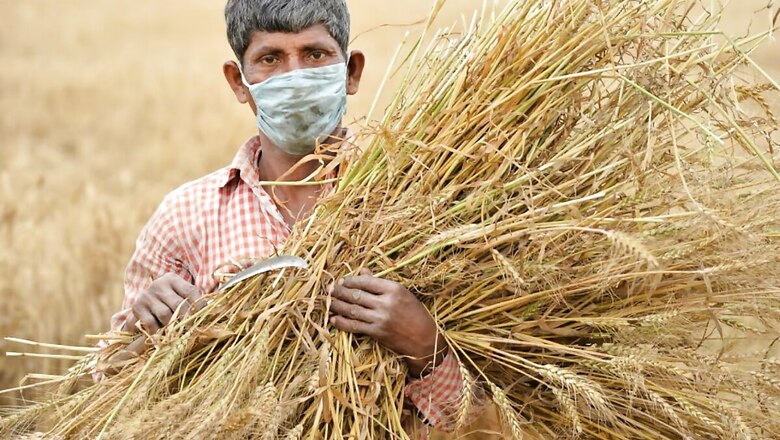
views
As a political battle rages over the opening up of the farming and agricultural produce procurement sector to big private players, farmers in one of the biggest food grain and vegetable producing states, Uttar Pradesh, are in a fix. Unlike the farmers in Haryana and Punjab, in UP the community, though a bit suspicious of the farm bills cleared by Parliament, is still in a mood to wait and watch. This is because dealing with private players, exploitation by both the government-controlled mandis and middlemen or agents of the open market is an existing bitter reality for them.
However, at the moment when the Centre and the ruling Bharatiya Janata Party have been trying to convince the farmers that government mandis will continue to exist, the procurement system and the minimum support price (MSP) situation in Uttar Pradesh is a big disappointment for many. That is because the government procurement is never more than 15 per cent of the total crop yield and a majority of farmers never get the MSP returns on their crops.
The ground situation in UP shows how both the government and the open markets can be exploitative for the farmers, especially where the bulk of the tillers constitute the poor and marginalised. With the average landholding being even less than the national average of 1.15 hectare, more than 80 per cent of farmers in UP fall below the mark.
WHY GOVERNMENT MANDIS ARE INEFFICIENT
The first obvious question is why unlike Haryana, Punjab and even states like Madhya Pradesh and Maharashtra, the government mandi and procurement system is so inefficient in Uttar Pradesh. It should not come as a surprise that this year, wheat procurement by the state government was just at 36 lakh metric ton, which was far below the target of 55 lakh metric ton. Such low purchase happened despite the fact that the state has produced a record 385 metric tons of wheat.
This is also the reality when it comes to rice purchase, even though the BJP government in the state led by Yogi Adityananth had been making big claims about improved mechanisms for government procurement.
Professor Sudhir Panwar of Lucknow University, who works for farmers’ rights especially in western UP, says, “Like all other public sectors, in agriculture too, the government wants to pull back its operations and create a space for private players. That’s the reason why over the years government mandis have slowly been made less attractive, procurement mechanisms and the entire supply chain from fields to mandis and storage centres have been neglected. The new farm bills are going to further reduce the government’s role and control in this sector. If the government’s intent is clear, it should make a written provision that open-market purchases from the farmers will not be less than the MSP.”
DEPENDENCE ON OPEN MARKETS AND THE REALITY
With government procurement being less than 15 per cent of the total harvest, the open markets in their present structure are the only remaining option for the farmers. But experience shows that this open market has its own share of exploitation. Rarely big firms or companies do direct business with farmers, the bulk of whom have small landholdings.
The farmer has no other option but to deal with the middlemen, or Adhatiyas as they are known in local language. The Adhatiyas generally pay less than the MSP. The only solace for the poor farmer is that he gets just enough cash in hand to meet his investment requirements for sowing the next crop.
Even the well-to-do farmers are not safe from exploitation and payments less than the MSP in the open market. Amrendra Singh, with around 300 bighas of land in UP’s Barabanki district, shares his experience. “For any farmer, transportation of his produce and finding the right buyer is a big challenge. Reaching the market through the middleman is a reality and hence farmers like us are also often not in a position to bargain,” he says.
Amrendra too wants that while opening the market directly for big companies and corporates, the government should ensure no purchases can be made below the MSP. “If the government can’t act as a guarantor of prices for the farmers, the new bills can increase the exploitation,” he adds.
Brijesh Shukla, an independent journalist who reports extensively on farmers’ issues, says, “In Punjab and Haryana, farmers have large landholdings, they hold an influence over the government and that’s the reason why mandis have worked well for them. The maximum purchase is on the MSP and that’s the reason why they are afraid of the new changes. But in UP it has been a largely different story, and that’s why farmers here are still unable to take a clear position on the new bills.”
ROAD AHEAD AND POSSIBLE DANGERS
At the moment, as the government and the opposition lock horns over the merits and demerits of the new bills, serious doubts remain over the road ahead. On the opposition’s charges of betraying the farmers’ interests, Prime Minister Narenra Modi has assured the nation that neither will the MSP mechanism be diluted nor will the government procurement and mandis stop doing business.
But, on the ground, a veil of suspicion lingers. The farmers are especially unsure about how the large section of poor and small-scale farmers will be able to deal with the new form of contract farming and open market regulations. Manoj Singh, a middle income group farmer from Tandpur village of Barabanki, feels that small farmers will not be in a position to decide terms and conditions of contract farming and rates with big corporates and industries. “The poor and marginalised farmers can be further pushed to the wall under the new laws,” he says.
Professor Prashant Trivedi of Giri Institute of Development study cites his research and says, “Past experiences from different parts of the country show that big companies are inclined to deal with big farmers. Working with small landholders escalates their investment and procurement costs. Hence, the question remains how will they approach the poor and marginalised farmers, especially in states like Uttar Pradesh.”
Another aspect is that of the MSP. At the moment even if a farmer doesn’t get paid the MSP in the open market, the fixed price still acts like a certain benchmark. Even if the payment to the farmer is less, the open market is forced to work along the price range of the MSP.
“Farmers are therefore justified in their demand that the government should give a written assurance that it will continue with the MSP mechanism and that private players will not be able to decide their own rates,” Professor Trivedi maintains.
As political parties continue to battle over what is being termed as long-awaited structural reforms in the agriculture sector, there is a long road ahead to determine the actual impact of the potential new laws. The impact in turn will redefine the mood and politics on the ground. For the moment it is more of a wait-and-watch scenario for the “Annadata”.




















Comments
0 comment